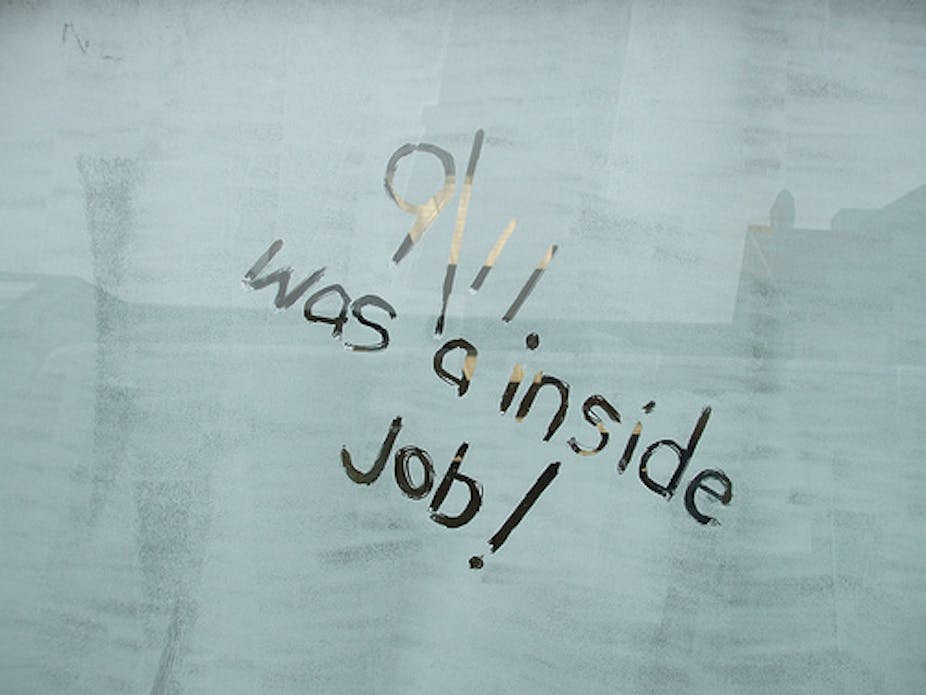Osama bin Laden is dead. Or is he?
The newly-deceased Saudi militant was long a central figure for the world’s conspiracy theorists. He was actually a CIA agent said some. He really died of kidney failure in 2001. He never even existed and the whole 9/11 attack was faked by the United States government.
Days before announcing the demise of America’s enemy number one, President Obama had released the long form of his birth certificate in the hope of killing another conspiracy theory holding that he was not born in the United States.
Fat chance. Conspiracy theories never die, they only mutate. Expect more on why he’s a Muslim sleeper. In league with still-breathing bin Laden.
Why are there conspiracy theories, and what makes people believe them? The classical theories, from the anti-Semitic Protocols of the Elders of Zion a century ago (still live in Arab countries) to the CIA-did-it 9/11 theories of our own day, share some common features.
They posit an inner group of the powerful who pull the wool over ordinary folks’ eyes and are powerful enough to cover up the traces. They are believed by the powerless. And there is no evidence for them.
Why people believe conspiracy theories is a much-debated question. An obvious cause is the resentment of the powerless, to whom it provides an easy explanation of their position.
But perhaps just as important in the sheer joy humans take in the discovery (or “discovery”) of hidden causes below the flux of experience. As the Australian philosopher David Stove said, there is always a market for the “Secret History of the Court of King So-and-So”, which reveals the true evil powers behind the throne.
That is one of the reasons why the theory of evolution is so enjoyable – it explains so much by hidden causes. To that is added the natural tendency to want to explain away disagreement with oneself. If my enemies disagree with me, they can’t be rational, so what causes explain their failure to see reason?
That motive is probably the most important in the twin conspiracy theories thtat infect the struggle over climate science: climate sceptics suspect scientists are alarmist in a bid to get bigger grants, while believers in anthropogenic warming smear the sceptics as “denialists” in the pay of the Coal Institute Disinformation Bureau.
The effect of the Internet on the spread of conspiracy theories is hard to gauge. It does contribute to their spread, of course, but it also allows much easier access to contrary evidence. Anyone who hears of but is initially uncommitted to, say, a 9/11 conspiracy theory, can look up Wikipedia before being sucked in.
Then again, there are real conspiracies, and the conspirators can take advantage of the general scepticism about theories of conspiracy. The CIA really did conduct mind-control experiments on innocent citizens in the 1950s, and Nixon really did conspire to cover up Watergate.
Or take a case closer to home, which could be called a conspiracy for good. In 1979 the “boat people” crisis reached a head, with the Vietnamese government virtually expelling a million people and south-east Asian nations threatening to tow the boats back out to sea.
The Fraser government collaborated in a US-led plan to parcel all of them out to host countries. Neither the Australian nor the other governments involved asked their citizens if they would like an Asian refugee inflow, nor did they tell them the numbers that would be coming.
Australia took an extraordinary 200,000. Conspiracy? Certainly a far-reaching secret plan with disclosure on less than a need-to-know basis.
Care is needed. There are real conspiracies. There are crazy conspiracy theories believed only by gullible rednecks. The theory “Only gullible rednecks much stupider than myself believe conspiracy theories” may be self-serving.
There is nothing for it but to evaluate the evidence for and against, case by case, before committing the emotions.
In the meantime, lookout for Osama bin Laden working behind the counter at your local convenience store soon.

